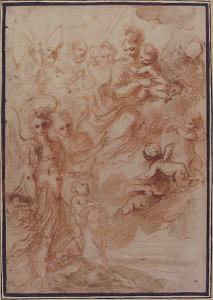8. Banzoli’s Soul Sleep Leads Him to Believe That the Soul of Jesus Christ “Died” — Didn’t Exist — Between His Death and Resurrection, and That He was Unconscious in His Human Nature During That Time
Lucas Banzoli is a very active Brazilian anti-Catholic polemicist, who holds to basically a Seventh-Day Adventist theology, whereby there is no such thing as a soul that consciously exists outside of a body, and no hell (soul sleep and annihilationism). This leads him to a Christology which is deficient and heterodox in terms of Christ’s human nature after His death. He has a Master’s degree in theology, a degree and postgraduate work in history, a license in letters, and is a history teacher, author of 25 books, as well as blogmaster (but now inactive) for six blogs. He’s active on YouTube.
This is my 42nd refutation of Banzoli’s writings. Since 5-25-22 he hadn’t written one word in reply, until he responded on 11-12-22 to Part 5 of my series on souls. Why? Because my articles are “without exception poor, superficial and weak” and my “objective” was “not to refute anything, but to exhaust [my] opponent.” Indeed, my writings are so bad that “only a severely cognitively impaired person would be inclined to take” them “seriously.” He didn’t “waste time reading” 37 of my 40 replies (three articles are his proof of the worthlessness of all of my 4,000+ articles and 51 books). He also denied that I had a “job” and claimed that I didn’t “work.” I disposed of these and other slanderous insults on my Facebook page on 11-13-22. But Banzoli thought that replying to me was so “entertaining” that he’ll “make a point of rebutting” my articles “one by one.”
My current effort is a major multi-part response to Banzoli’s 1900-page self-published book, The Legend of the Immortality of the Soul [A Lenda da Imortalidade da Alma], published on 1 August 2022. He claims to have “cover[ed] in depth all the immortalist arguments” and to have “present[ed] all the biblical proofs of the death of the soul . . .” and he confidently asserted: “the immortality of the soul is at the root of almost all destructive deception and false religion.” He himself admits on page 18 of his Introduction that what he is opposing is held by “nearly all the Christians in the world.” A sincere unbiblical error (and I assume his sincerity) is no less dangerous than a deliberate lie, and we apologists will be “judged with greater strictness” for any false teachings that we spread (Jas 3:1).
I use RSV for the Bible passages (including ones that Banzoli cites) unless otherwise indicated. Google Translate is utilized to render Lucas’ Portugese into English. Occasionally I slightly modify clearly inadequate translations, so that his words will read more smoothly and meaningfully in English. His words will be in blue.
*****
See the other installments:
See also the related articles:
Seven Replies Re Interceding Saints (vs. Lucas Banzoli) [5-25-22]
Answer to Banzoli’s “Challenge” Re Intercession of Saints [9-20-22]
Bible on Praying Straight to God (vs. Lucas Banzoli) [9-21-22]
Reply to Banzoli’s “Analyzing the ‘evidence’ of saints’ intercession” [9-22-22]
*****
A similar case can be seen when the psalmist exclaims: “I hold my life [nephesh] in my hand continually, but I do not forget thy law.” (Ps 119:109). We must ask ourselves, what danger was his soul always exposed to? A “danger” of staying alive (because it cannot die) and going into the presence of God? It seems not. Obviously, the danger the psalmist refers to is that of his nephesh dying at the hands of his persecutors, a very frequent theme in the Psalms. This is because they did not see the soul as an immortal entity belonging to another world, but, on the contrary, as vulnerable as any part of the body. (p. 142)
Lay down one’s soul – If any one can risk his soul, in the sense of exposing his soul to a risk of death, he can also give his soul, in the sense of voluntarily submitting it to death on behalf of someone. This language was used a lot by Jesus in the NT, but had already been used of him since Isaiah, who prophesied that God would “make his soul an offering for sin” (Isaiah 53:10 [KJV]). (p. 143)
“As the Son of man came not to be served, but to serve, and to give his soul a ransom for many” (Matthew 20:28 [Smith’s Literal Translation]). It is psyche that is found in the Greek. (p. 144)
[I]f Christ had to die bodily to redeem our body, why wouldn’t he have to die as a soul to redeem our soul? If body and soul are two distinct entities and Jesus died for both, it is clear that he would have to to die in body and soul, not just in body. The price to be paid for our redemption was death, and if death was in our place, it embraces body and soul, for both were redeemed at the cross. In other words, to say that the soul of Jesus did not experienced death is the same as saying that our soul did not need redemption. . . .
Jesus was clear: his own soul would die in our favor. He would sacrifice not only his body but also his soul. His sacrifice was complete. To deny this is to diminish the Saviour’s sacrifice. (pp. 1072-1074)
Banzoli cited in this sense four more passages, which I will paste from the RSV:
John 10:11, 15, 17 I am the good shepherd. The good shepherd lays down his life [psyche] for the sheep.. . . [15] . . . I lay down my life [psyche] for the sheep.. . . [17] . . . I lay down my life [psyche] . . .
John 15:13 Greater love has no man than this, that a man lay down his life [psyche] for his friends.
In all these texts, life (here portrayed as soul-nephesh) is taken because there is no life left, not because it has been transferred to another dimension. Likewise, in the resurrection, life returns because the individual comes into existence again as a living being or a living soul, not because he was alive somewhere else and then had to return to the body. (p. 163)
Life is only possible to be experienced in the present body or in the resurrection body, . . . the Hebrews did not imagine the soul as a ghost that survives outside the body, but only like the life that is lived in the body. Therefore, killing the body was killing the soul, . . . (p. 165)
But we know that Jesus — in His human nature — was still in existence after He died, because He descended to Sheol to preach to the captives:
Ephesians 4:8-10 Therefore it is said, “When he ascended on high he led a host of captives, and he gave gifts to men.” [9] (In saying, “He ascended,” what does it mean but that he had also descended into the lower parts of the earth? [10] He who descended is he who also ascended far above all the heavens, that he might fill all things.)
1 Peter 3:18-20 For Christ also died for sins once for all, the righteous for the unrighteous, that he might bring us to God, being put to death in the flesh but made alive in the spirit; [19] in which he went and preached to the spirits in prison, [20] who formerly did not obey,
Banzoli does manage to maintain the divinity of Christ, however, by believing that His Divine Nature never ceased to exist at any time:
On the other hand, we must not forget that Jesus was not just any man, but God incarnate. And, in His divine nature, Jesus never passed through death, for it is not possible for divinity to die or cease to exist for even a second (1 Timothy 6:16 [“who alone has immortality”]). This is what distinguishes the case of Jesus from ours, since none of us are God incarnate, nor do we have a divine nature. Thus, Jesus is a sui generis case – a unique and singular case, that cannot be compared to any other. He is the only one who can “die and not die” (die like a man, and not die like God). (p. 1074)
I was mistaken about this before I discovered the above passage, on 2-21-23. He had not directed me to it, even though I asked him more than once to clarify and explain his Christology, and stated that I would retract and publicly apologize for getting his views wrong, if that turned out to be the case (and I’m very happy that I was wrong).
I found the passage above in a search of his 1900-page Portugese book on the soul. In light of this, I offer Lucas Banzoli my sincere and full apology for wrongly classifying him as a non-Christian and non-trinitarian. I was going by the information I had, in the absence of clarification from him, that would have prevented my erroneous conclusion. I will change my introduction to my rebuttals of his work accordingly, and try to remove any other inaccurate references of this nature in my many replies.
***
Practical Matters: Perhaps some of my 4,000+ free online articles (the most comprehensive “one-stop” Catholic apologetics site) or fifty books have helped you (by God’s grace) to decide to become Catholic or to return to the Church, or better understand some doctrines and why we believe them.
Or you may believe my work is worthy to support for the purpose of apologetics and evangelism in general. If so, please seriously consider a much-needed financial contribution. I’m always in need of more funds: especially monthly support. “The laborer is worthy of his wages” (1 Tim 5:18, NKJV). 1 December 2021 was my 20th anniversary as a full-time Catholic apologist, and February 2022 marked the 25th anniversary of my blog.
PayPal donations are the easiest: just send to my email address: [email protected]. You’ll see the term “Catholic Used Book Service”, which is my old side-business. To learn about the different methods of contributing, including 100% tax deduction, etc., see my page: About Catholic Apologist Dave Armstrong / Donation Information. Thanks a million from the bottom of my heart!
***
Photo credit: Saint Michael the Archangel and Another Figure Recommending a Soul to the Virgin and Child in Heaven, by Bartolomeo Biscaino (1629-1657) [public domain / Wikimedia Commons]
***
Summary: Part 8 of many responses to Lucas Banzoli’s 1900-page book, The Legend of the Immortality of the Soul: published on 1 August 2022. I defend historic Christianity.














